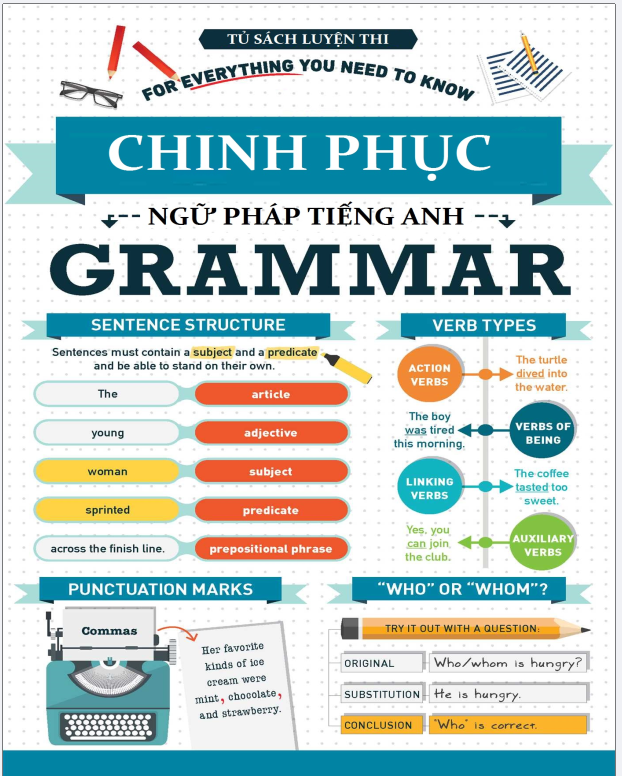MỤC LỤC
- Các thì trongtiếng anh........................................................................................ 2
- Sự hòa hợp giữa chủ ngữ và động từ................................................................... 9
- Câu hỏi đuôi (Tagquestions)............................................................................ 16
- Mệnh đề “wish”– ước muốn............................................................................ 22
- Động từ khuyết thiếu (Modal verbs)................................................................. 27
- Cụm độngtừ (Phrasal verbs)............................................................................. 34
- Nguyên mẫu có “to”/nguyên mẫu không “to” (To-infinitive/bare-infinitive).. 41
- Danh độngtừ (Gerunds)....................................................................................................................... 4747
- Phân từ (Participles).......................................................................................... 53
- Mệnh đề trạngngữ (Adverbial clause)............................................................ 58
- So sánh (Comparision)..................................................................................................................... 6868
- Câu bị động (Passivevoice)..................................................................................................................... 7373
- Các loại từ (Word form)..................................................................................................................... 7979
- Số lượng (Quantity)..................................................................................................................... 8787
- Giới từ (Preposition)..................................................................................................................... 9191
- Mạo từ (Articles)..................................................................................................................... 9898
CHUYÊN ĐỀ NGỮ PHÁP – TỪ VỰNG
- CÁC THÌ TRONGTIẾNG ANH:
Tiếng Anh có12 thì cơ bản, được thể hiện trong bảng sau:
| Hiện tại | Quá khứ | Tươnglai |
| * Cấu trúc: | * Cấutrúc: | * Cấutrúc: |
| - Với động từ thường: | - Với động từ thường: | - Với động từ thường: |
| (+) S + V(s/es)+ O | (+) S + V(ed)+ O | (+) S + will + V + O |
| (-) S + do/does + not + V (?) Do/does+ S + V? | (-) S + did + not + V + O (?) Did +S + V + O? | (-) S + will + not + V + O |
| - Với động từ “to be”: | - Với động từ “to be”: | (?) Will + S + V + O? |
| (+) S +am/is/are + O (-) S + am/is/are + not + O | (+) S + was/were + O (-) S + was/ were + O | Từ nhận biết: tomorrow, next week, next month, next year… |
| (?) Am/is/are + S + O? | (?) Was/were + S + O? | * Cáchdùng: |
Đơn | Từ nhận biết:always, every, usually, often, generally, frequently * Cáchdùng:
| Từ nhận biết: yesterday, yesterday morning, last week, last month,last year, last night * Cáchdùng: - Diễn tả thói quen trong quá khứ hoặc một hành động đã hoàn thành trong quá khứ. (She finished her exam yesterday.) |
|
| - Diễn tả một sự kiện trong tương lai đã lên lịch sẵn như một phần của kế hoạch (thời gian biểu, lịch chiếu phim, lịch tàu xe…) (The plane flies at 8a.m.) |
|
|
| * Cấutrúc: (+) S + be (am/is/are) + V-ing + O | * Cấutrúc: (+) S + was/were + V-ing + O | * Cấutrúc: (+) S + will + be + V-ing + O |
Tiếp diễn | (-) S + be + not+ V-ing + O (?) Be + S + V-ing + O? Từ nhận biết: now,right now, at present, at the moment * Cách dùng:
Lưu ý: Không dùng thì này với các động từ chỉ nhận thức, tri giác như: see, hear,understand, know, like, want, glance, feel, think, smell,love, hate, realize, seem, remember, forget… | (-) S + was/were + not + V- ing + O (?) Was/were + S + V-ing + O? Từ nhậnbiết: while, at the very moment * Cách dùng:
| (-) S + will + not + be + V-ing + O (?) Will+ S + be + V-ing + O? * Cách dùng:
grandparents next Sunday.) |
Hoàn thành |
(+) S + have/has + PII + O (-) S + have/has + not + PII + O (?) Have/has + S + PII + O? Từ nhận biết: already, not yet, ever, never, since,for, recently, before
|
(+) S + had + PII + O (-) S + had + not + PII + O (?) Had + S + PII + O? Từ nhận biết: after, before, as soon as, by the time, when
- Diễntả hành độngđã hoàn thành trongquá khứ, xảyra trước một hành động quá khứ khác. (When I came home, she had already cooked dinner.) |
(+) S + will + have + PII + O (-) S + will + not + have + PII + O (?) Will + S + have + PII + O? Từ nhận biết: by the time, prior to the time
- Diễn tả hành động sẽ được hoàn thành trước khi một hành động khác xảy đến. (I will have cleaned the room when Mom comes home.) |
Hoàn thành tiếp diễn |
(+) S + has/have + been + V-ing + O (-) S + hasn’t/haven’t + been + V-ing + O (?) Has/have + S + been + V-ing + O? Từ nhận biết: all day, all week, since, for, for a long time, almost every day this week, recently, lately, in the past week, in recent years, up until now, so far
- Nhấn mạnh khoảng thời gian của 1 hành động đã xảy ra trong quá khứ và tiếp tục tới hiệntại ( có thểtiếp diễn trongtương lai). (They have beencelebrating for more thana week up until now.) |
(+) S + had + been + V-ing + O (-) S + had + been + V-ing + O (?) Had + S + been + V-ing + O? Từ nhận biết: until then, by the time,prior to that time
- Nhấn mạnh khoảng thời gian của 1 hành động đã đang xảy ra trong quá khứ và kết thúc trước một hành động quá khứ khác. (My teacher had been teaching English 10 years before retired.) |
(+) S + will + have + been + V-ing + O (-) S + will + not + have + been + V-ing+ O (?) Will + S + have + been + V-ing + O? Từ nhận biết: by the time, priorto the time
- Nhấn mạnh khoảng thời gian của 1 hành động sẽ đang xảy ra trong tương lai và sẽ kết thúc trước 1 hành động tương lai khác. (I will have worked for this company for 6 years by this time next year.) |
- Jane her raincoat on when it raining.
A. put/start B. puts/started C. put/starting D. put/started
- The man got out of the car, round to the back and opened the boot.
A. was walking B. walked C. walks D. had walked
- He will take the dog out for a walk as soon as he dinner.
- finish B. finishes
C. will finish D. shall have finished
- When I last Jane, she to find a job.
A. see/was trying B. saw/was trying C. have seen/tried D. saw/tried
- I have never played badminton before. This is the first time I to play.
A. try B. tried C. have tried D. am trying
- We all our school work by tomorrow.
- finish B. finishing
C. be finishing D. will have finishing
- She the living room when she heard a strange noise in the kitchen.
A. has cleaned B. has been C. cleaning D. was cleaning
- I envy you. At five tomorrow, you some tan on the beach at the seaside.
- will get B. will be getting
C. will have gotten D. will have been getting
- I went to Belgium last month. I there before. It’s a beautiful country.
A. have never been B. had never been C. never was D. never been
- Almost everyone for home by the time we arrived.
A. leave B. left C. leaves D. had left
- He must be very hungry. He anything in three days.
A. didn’t eat B. hasn’t eaten C. hadn’teaten D. wasn’t eating
- I’m going on holidayon Saturday. This time next week I on a beach in the sea.
A. will lie B. am lying C. will be lying D. should be lying
- Yesterday I in the park when I saw Dick playing football.
- was walking B. is walking
C. has walked D. has been walking
- My mother very happy when she her old friend again two days ago.
A. was/met B. had been/met C.has been/meets D. has been/met
- She was playing games while he a football match.
A. watched B. watches C. was watching D. watching
- Look! That man to open the door of your car.
A. try B. tried C. is trying D. has tried
- I here at the end of the month.



